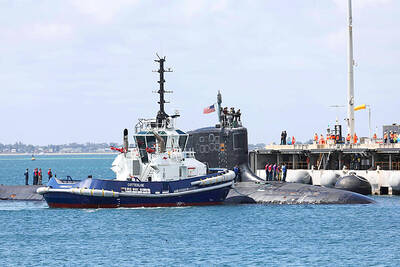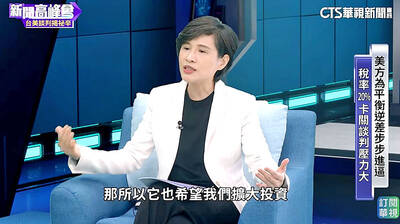The Democratic Progressive Party (DPP) yesterday passed a resolution urging party representatives and officials to gather public support for the release of former president Chen Shui-bian (陳水扁) for medical treatment.
“The DPP urged its councilors and representatives at various levels nationwide to solicit support [for Chen’s medical release] and called for more support from civic groups with the resolution,” DPP spokesperson Lin Chun-hsien (林俊憲) said after the Central Executive Committee meeting.
The party had passed two similar resolutions on the medical rights of Chen, who is serving a 17-and-a-half-year sentence for corruption, when Kaohsiung Mayor Chen Chu (陳菊) served as acting chairperson, but there were no substantial measures stated in the resolutions.
Several civic groups had launched petitions for the same cause, but failed to draw strong support.
However, the momentum appeared to have changed after the Greater Taichung Council on Friday passed a motion calling for the release of Chen for medical treatment as soon as possible and several doctors launched an online petition recently.
DPP Chairman Su Tseng-chang (蘇貞昌) drew criticism for his refusal to sign the petition despite his verbal support for the medical release.
With the resolution, which represents the DPP’s official position and approach, Lin said that Su thought it would put the party in a better position in its effort to seek Chen’s medical release.
Ko Wen-je (柯文哲), director of the National Taiwan University Hospital’s traumatology department and one of the doctors who launched the petition, was invited by Su to brief the Central Executive Committee yesterday on Chen’s health.
Ko, who had visited Chen at the Taipei Prison to examine him, told reporters after the briefing that Chen’s confinement in a 4.56m2 cell had affected the former president’s physical as well as mental health.
“As a prisoner — let alone a former president — Chen deserves at least a bed and a table, but he has been sleeping and writing on the floor,” Ko said.
“I don’t think a former president should be treated this way, and I don’t think there has been a president treated this way in the world,” he added.
Both Ko and Su called for “closure on Chen’s corruption case, which had caused serious political division in Taiwan,” with Ko saying that the release of Chen for medical treatment “may not eliminate the internal fighting, but it could at least alleviate the division.”
Ko said he had offered his observations as a doctor and did not care about the political ramifications or whatever the DPP’s decision might be.
Ko’s opinions on Chen’s health echoed the conclusion of three US-based medical experts who visited Chen on June 11 and said they would make a report to the US Congress.
Chen’s condition has caught the attention of the US Congress, with US Representative Dan Lungren calling on the Tom Lantos Human Rights Commission to investigate Chen’s imprisonment.
The call for granting Chen a presidential pardon or a release for medical treatment surfaced earlier this year. However, President Ma Ying-jeou (馬英九) has made it clear that he would not grant such a pardon.

CSBC Corp, Taiwan (台灣國際造船) yesterday released the first video documenting the submerged sea trials of Taiwan’s indigenous defense submarine prototype, the Hai Kun (海鯤), or Narwhal, showing underwater navigation and the launch of countermeasures. The footage shows the vessel’s first dive, steering and control system tests, and the raising and lowering of the periscope and antenna masts. It offered a rare look at the progress in the submarine’s sea acceptance tests. The Hai Kun carried out its first shallow-water diving trial late last month and has since completed four submerged tests, CSBC said. The newly released video compiles images recorded from Jan. 29 to

DETERRENCE EFFORTS: Washington and partners hope demonstrations of force would convince Beijing that military action against Taiwan would carry high costs The US is considering using HMAS Stirling in Western Australia as a forward base to strengthen its naval posture in a potential conflict with China, particularly over Taiwan, the Wall Street Journal reported on Saturday. As part of its Indo-Pacific strategy, Washington plans to deploy up to four nuclear-powered submarines at Stirling starting in 2027, providing a base near potential hot spots such as Taiwan and the South China Sea. The move also aims to enhance military integration with Pacific allies under the Australia-UK-US trilateral security partnership, the report said. Currently, US submarines operate from Guam, but the island could

RESTRAINTS: Should China’s actions pose any threat to Taiwan’s security, economic or social systems, China would be excluded from major financial institutions, the bill says The US House of Representatives on Monday passed the PROTECT Taiwan Act, which states that Washington would exclude China from participating in major global financial organizations if its actions directly threaten Taiwan’s security. The bill, proposed by Republican Representative Frank Lucas, passed with 395 votes in favor and two against. It stipulates that if China’s actions pose any threat to Taiwan’s security, economic or social systems, the US would, “to the maximum extent practicable,” exclude Beijing from international financial institutions, including the G20, the Bank for International Settlements and the Financial Stability Board. The bill makes it clear that China must be prepared

Taiwanese trade negotiators told Washington that Taipei would not relocate 40 percent of its semiconductor production to the US, and that its most advanced technologies would remain in the nation, Vice Premier Cheng Li-chiun (鄭麗君) said on Sunday. “I told the US side very clearly — that’s impossible,” Cheng, who led the negotiation team, said in an interview that aired on Sunday night on Chinese Television System. Cheng was referring to remarks last month by US Secretary of Commerce Howard Lutnick, in which he said his goal was to bring 40 percent of Taiwan’s chip supply chain to the US Taiwan’s almost